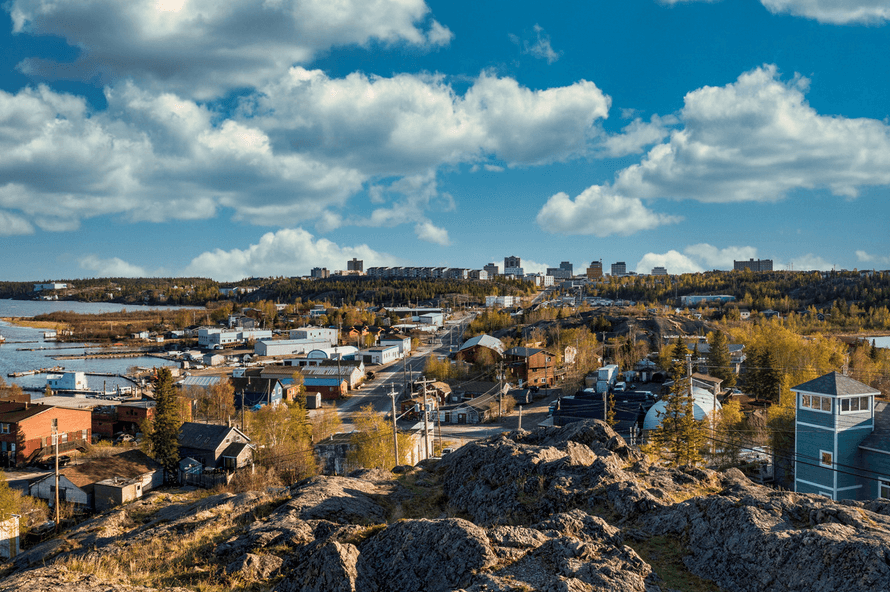As the conversation around climate change and environmental sustainability continues to gain momentum, the importance of eco-friendly living practices has never been more critical, particularly in unique northern environments like Yellowknife. With its stunning natural landscapes and a community that deeply values the environment, Yellowknife offers a distinctive opportunity to embrace sustainability. For renters, adopting green practices is not only a way to reduce their environmental footprint but also a step towards creating a more sustainable future for the community. This blog aims to provide valuable insights into effective and practical sustainable living strategies that renters in Yellowknife can easily implement. From energy-saving tips to waste-reduction practices, let’s explore how we can live harmoniously with nature while enjoying the comforts of our rental homes.
Energy Conservation
Efficient Heating and Insulation
For renters in Yellowknife, minimizing heating usage is crucial, especially given the colder climate. One effective strategy is the installation of smart thermostats, which allow for precise control over heating schedules, optimizing energy use and reducing unnecessary heating. Additionally, sealing windows can significantly prevent heat loss, which is often a major contributor to high energy bills. Using draft stoppers and weather stripping are simple yet effective methods to enhance window insulation. Furthermore, investing in energy-efficient curtains can add a layer of warmth by trapping heat inside during chilly months and keeping unwanted heat out in the summer, leading to more consistent indoor temperatures and reduced heating needs.
Lighting Tips
Switching to LED bulbs is a straightforward way to cut down on electricity consumption. LEDs use a fraction of the energy compared to traditional incandescent bulbs and last significantly longer, making them a cost-effective choice. Renters can also make better use of natural daylight by arranging furniture to maximize exposure to sunlight and opening curtains during the day. This not only reduces the need for artificial lighting but also creates a more inviting and healthful living environment.
Unplugging Devices
Even when devices and appliances are turned off, they can still draw “phantom” energy, which contributes to unnecessary energy consumption. Renters can significantly reduce their electricity usage by unplugging devices when not in use, or using power strips to easily disconnect multiple electronics at once. Developing a habit of turning off and unplugging devices can lead to noticeable savings on energy bills while also being an eco-conscious practice.
Waste Reduction and Recycling
Recycling Programs in Yellowknife
Yellowknife offers several recycling initiatives to help residents minimize waste and contribute to a more sustainable environment. Renters can participate by familiarizing themselves with the city’s curbside recycling program, which accepts materials like paper, cardboard, plastics, and metals. It is essential to sort recyclables properly and adhere to collection schedules to ensure efficient processing. Additionally, drop-off points for specific materials, such as glass and electronics, are available at designated locations, including the Yellowknife Solid Waste Facility. Here, residents can dispose of household hazardous waste like batteries and old appliances responsibly. Staying informed about the local recycling guidelines and participating actively are key steps renters can take to enhance their contributions to Yellowknife’s environmental goals.
Composting Options
Renters in Yellowknife have several composting options to reduce organic waste and enrich the soil, even within limited living spaces. The city often conducts community composting workshops to educate and encourage participation in municipal composting programs, where food scraps and yard waste can be dropped off at various collection sites. Alternatively, renters can explore indoor composting solutions, such as vermiculture, which uses worms to break down food waste into nutrient-rich compost. These compact systems are ideal for small apartments as they require minimal space and maintain an odour-free environment. By engaging in composting, renters can play a part in closing the waste loop and fostering a healthier ecosystem.
Sustainable Water Use
Mindful Water Use
Conserving water is essential to sustainable living, especially in a community like Yellowknife where resources can be limited. Renters can adopt several simple habits to reduce water consumption. Taking shorter showers is one effective method to conserve water; aiming for a five-minute shower instead of a longer one can significantly cut down on water usage. Additionally, turning off the tap while brushing teeth or shaving can save gallons of water each day.
Other Tips
- Fix Leaks Promptly: Even small leaks can lead to substantial water waste. Renters should report any leaks to their landlords immediately or fix them if possible to prevent continuous water loss.
- Use Full Loads Only: When using washing machines or dishwashers, ensure they are full before running a cycle. This maximizes the efficiency of water and energy use per load.
Sustainable Shopping and Eating Habits

Buying Local and Seasonal
Encouraging renters to purchase local and seasonal produce is a significant step towards reducing the carbon footprint associated with long-distance food transportation. Local goods not only travel shorter distances, which decreases emissions, but they are often fresher and harvested at peak ripeness, offering superior taste and nutritional value. Renters can support sustainable agriculture by opting for foods that are in season and grown by local farmers, fostering a closer connection to the food they consume while contributing to Yellowknife’s economy.
Eco-Friendly Products
Choosing eco-friendly products over conventional alternatives can further enhance a sustainable lifestyle. Opting for reusable household items, such as cleaning supplies made from natural ingredients and reusable cloths, can significantly minimize waste. These products often come in less packaging and reduce the reliance on disposable goods, which can end up in landfills. Transitioning to eco-friendly options is not only beneficial for the planet but can also lead to healthier living environments by avoiding harsh chemicals.
Local Farmers’ Markets
Yellowknife is home to a variety of farmers’ markets and eco-conscious businesses, offering renters the opportunity to shop sustainably within their community. The weekly markets are an excellent place to find fresh produce, artisanal goods, and locally sourced products. Renters can check the Yellowknife Farmers Market for schedules and vendor lists. Additionally, exploring local eco-conscious businesses not only supports the community but also helps renters discover unique, high-quality products that align with sustainable values. By shopping at these venues, renters can contribute to a more robust local economy while making environmentally friendly choices.
Green Transportation

Public Transport and Carpooling
Investing in green transportation options such as public transport and carpooling can significantly reduce greenhouse gas emissions and contribute to a more sustainable community in Yellowknife. The city’s public transportation system offers a practical alternative to individual car use, providing an efficient way to navigate the city without the environmental burden of driving a personal vehicle. Renters are encouraged to familiarize themselves with local bus routes and schedules to incorporate public transit into their daily routines. Additionally, carpooling with friends, family, or coworkers is another effective strategy to minimize the number of cars on the road, reducing traffic congestion and pollution. By sharing rides, individuals not only conserve fuel but also forge stronger community ties.
Walking and Biking
Walking and biking present viable, eco-friendly transportation solutions, particularly during Yellowknife’s warmer months. These modes of transport offer considerable health benefits, including increased cardiovascular fitness, improved mental well-being, and enhanced muscular strength, while simultaneously reducing one’s carbon footprint. The city provides numerous trails and bike-friendly paths that renters can utilize for their commutes or leisurely activities. Embracing walking or biking not only leads to a more active lifestyle but also lowers reliance on motor vehicles, helping to preserve the environment. By opting for these sustainable travel methods, renters can enjoy a greener lifestyle while contributing to a healthier, cleaner urban space.
Eco-Friendly Home Decor and Furnishings
Sustainable Furniture Choices
When it comes to furnishing a sustainable home, selecting second-hand or eco-friendly furniture is an excellent choice. Not only does this reduce the demand for new resources, but it also helps in minimizing waste. Antique or vintage pieces add character and uniqueness to a home, while also embracing the principles of reuse and recycling. Additionally, opting for furniture made from natural and sustainable materials like bamboo or reclaimed wood further promotes environmental friendliness. Bamboo, for instance, is a highly renewable resource due to its rapid growth rate and low environmental impact during cultivation. By incorporating these sustainable choices, renters can create a stylish, eco-conscious living space that contributes positively to the environment.
Benefits of Sustainable Living
1. Enviromental Impact
Adopting eco-friendly practices plays a crucial role in mitigating environmental impact. By reducing reliance on fossil fuels through sustainable transportation options like walking, biking, and public transit, individuals can significantly cut down their carbon footprint. Waste reduction efforts, such as composting and recycling, decrease the amount of waste sent to landfills, resulting in lower greenhouse gas emissions. Moreover, choosing locally sourced and seasonal foods reduces the environmental burden of long-distance transportation, further contributing to a decrease in global emissions. Collectively, these actions foster a healthier planet by slowing climate change and preserving ecosystems for future generations.
2. Cost Savings
Sustainable living extends beyond environmental benefits; it also offers substantial cost savings. By conserving energy through efficient practices, such as using energy-saving appliances and switching to LED lighting, renters can lower their electricity bills. Simple habits, like unplugging electronics when not in use, further contribute to energy conservation. Water-saving measures, including fixing leaks promptly and utilizing low-flow fixtures, translate to reduced water bills. Furthermore, minimizing waste through composting and recycling reduces the need for commercial waste disposal services. Collectively, these practices enable renters to enjoy significant savings over time, proving that economic efficiency pairs well with sustainability.
3. Health and Wellness
Engaging in sustainable practices significantly enhances health and wellness. Using non-toxic, eco-friendly products reduces exposure to harmful chemicals found in conventional cleaning supplies and personal care items. This shift minimizes the risk of respiratory issues, allergies, and skin irritations, promoting a healthier living environment. Additionally, sustainable practices like walking and biking not only aid in physical fitness but also improve mental well-being, reducing stress and enhancing mood. By embracing a lifestyle centered on sustainability, individuals can create cleaner, safer spaces that benefit both their physical and mental health, leading to a more balanced and fulfilling life.
Conclusion
There are numerous eco-friendly tips that renters in Yellowknife can adopt to live more sustainably. By choosing public transport, carpooling, walking, or biking, renters can significantly reduce their carbon footprint while fostering community connections. Embracing sustainable furniture and home decor options, such as second-hand or sustainably sourced items, reduces waste and adds unique character to living spaces. Furthermore, adopting practices like composting, recycling, and utilizing energy-efficient appliances can lead to considerable cost savings by lowering utility bills and reducing waste disposal expenses. These sustainable lifestyle choices not only positively impact the environment but also enhance personal health and wellness by reducing exposure to harmful chemicals and promoting physical fitness. Renters are encouraged to take these actionable steps, recognizing that building a sustainable future benefits everyone and contributes to a healthier planet for current and future generations.
Ready to start your Yellowknife journey? Rent in Yellowknife is the place to find the perfect rental and begin your adventures in Yellowknife today! Visit our Contact Page to get in touch!



